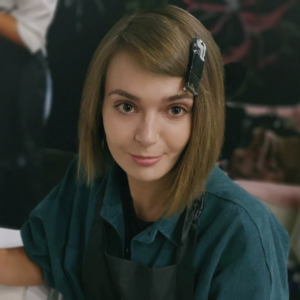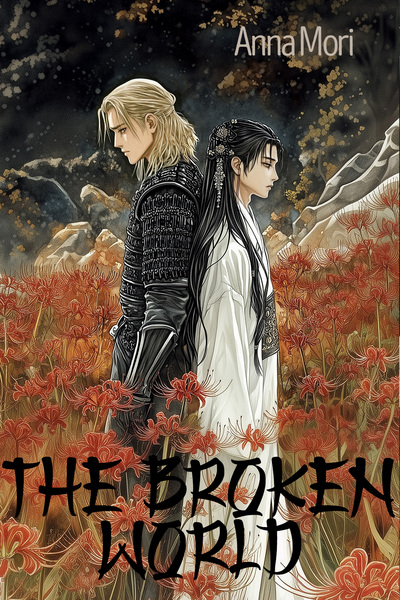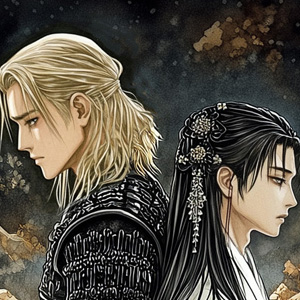Without realizing it, he pinched his own hand. Yet Yukinari remained standing there, solid and real — one stray lock of hair falling loose from his carefully arranged coiffure to frame his pale face. His serene, dignified smile remained unchanged, and the strange creature coiled around his arm, a living ornament of blackened silver — straight out of legends and folktales. The very tales that Gerel himself had always dismissed as fanciful nonsense, fit only for illiterate peasants or decrepit Taoists.
Of course, Gerel knew that everyone — peasants or otherwise — had once wanted to believe in dragons, magic, soul reincarnation, doors to other worlds, talking birds, or foxes that could transform into humans. But such wonders always slipped away like shadows, retreating into darkness, never letting themselves be touched. As you grew older, your belief in such things faded, and you stopped chasing those elusive phantoms. Over time, especially with people like Tokhung around, you learned to scoff at the mere mention of mysticism.
"When I was young, I was told that the Ryukoku Imperial family has always been guarded by the Celestial Dragon," Yukinari said. "But I never believed it. Even now, I don't know if this one is the Dragon Sovereign our country reveres. But it is a dragon, and as you can see — it is real. It speaks to me. Not with words... but I hear its voice in my mind. It came to me when I was twelve. At the time, I was... unwell. I had bad days..." He paused, then, seeing Gerel's uncomprehending look, sighed and clarified. "I wasn't thinking clearly back then. Sometimes, I couldn't tell reality from my own fantasies. But the dragon came to me and spoke. It helped me find clarity, helped me stop fearing the world around me, helped me believe in myself and my dreams."
At that moment, Yukinari looked almost otherworldly. Radiant, joyous — a living embodiment of the miraculous. His face, lit by moonlight, seemed detached, ethereal.
He took a few steps closer to Gerel and clasped his hand with his slender fingers.
The dragon still coiled around the other arm, its turquoise-tinted scales shimmering faintly. Gerel resisted the urge to touch them, to see if they'd dissolve like mist beneath his fingertips.
"You said you don't believe in miracles," Yukinari continued. "But the world is full of them. It's brimming with wonders. The dragon tells me stories... Look at the stars. Do you see them? The Dipper, the Bull, the Roof?"
He pointed upwards. The stars glittered above, flowing like a celestial river. Constellations of the autumnal Sky-Tortoise kingdom spread across the heavens, while the Morning and Evening Golden Star blazed near the horizon.
"One day, the dragon told me that all stars are suns — some small, some massive; white, yellow, red, blue... And near them, there are worlds, inhabited worlds, both like and unlike ours. If only we could learn how to reach them. Do you understand? There are other worlds, fantastic beings, unimaginable powers. The dragon says there are people who can fly, people who can change their forms, people who can ignite flames with a glance... There are lands where people look like you — light-eyed, with hair like gold, like the bark of trees, like fox fur. If we could find them, people like you wouldn't need to hide their faces behind a silly cat mask. You're extraordinary. Haven't you ever felt like you were meant for something greater? Together, we could change the world. If it means becoming immortal, we could do that too. We could stop the war. Unite nations. We could do anything. Trust me. Just say the word — yes or no..."
Yukinari's voice was hypnotic, and Gerel listened, silent and intent. It was easy to believe, just for a moment, that everything the emperor said was true. In fact, their lives — the life of Yukinari and his own — did seem to mirror one another in strange, entrancing ways.
After all, he'd been alone for so long. It felt comforting to find someone equal to him, someone who understood, even if they had first met as enemies. While Yukinari spoke, holding his hand and looking at him with wide, dark eyes, Gerel could almost believe that they were destined for something greater — that their paths had always led to this moment, where they, two divine favorites, would join forces to mend the broken world.
But the instant Yukinari fell silent, the illusion crumbled. Reality intruded: the most brilliant mind Gerel had ever encountered had been ensnared by madness. The poor fool cradled a strange creature in his hand and believed it to be a sign of divine favor. Worse yet, he was inviting Gerel to share in this madness.
"To be frank, Your Majesty, I don't believe in divine blessings," Gerel said, his tone sharp enough to sting. He saw Yukinari flinch, his expression momentarily helpless and childlike.
Gerel gently removed Yukinari's hand from his own and continued coldly, firmly:
"I don't believe the Dragon or the Tiger care about us in the slightest. We shape our own fates. Even if gods exist — and I doubt they do — they're cruel monsters beyond comprehension. You may be right that the world holds strange creatures, and you've been lucky enough to find one. But miracles? No. I don't believe in them. Nor in your beautiful vision of the future. I think we live in the world we deserve. You can deceive yourself all you like, but we're only human..."
His own voice sounded foreign to him. He knew his words were hurting Yukinari, and part of him wanted them to. Yukinari had opened an old wound in him, one Gerel thought had long since healed.
Frightened by the unfamiliar harshness in his voice, the dragon slipped off the emperor's arm and dove soundlessly back into the pond, vanishing as if it had never been there at all.
Once, Gerel had believed in miracles. Or at least, he'd wanted to.
When he was ten, he had run away from his master's house after yet another beating — not as bad as the time they'd broken his fingers and ribs, but bad enough to drive him out into the steppe. The tall grasses reminded him of the South where he was born, of the Wastelands at the very edge of the world. There, above his head, the fading silver sky had been shining, around him, the tall, chest-high grass had been rustling, and at some point he had been overwhelmed by such a piercing desire to believe that he had cried out, raising his arms to the heavens, begging to be taken away to the world his mother used to tell him about.
No one came. No one took him away.
Eventually, he trudged back, crushed by the weight of his own insignificance.
Like Yukinari, he had his own "bad days" — when he maybe didn't confuse reality with dreams, but he really wanted to...
He stopped believing in miracles not that day, but several years later.
The day his mother lay in the grass, trampled by hooves. He had already understood the truth but kept shaking her, unable to let go of the belief that she was special, that such a thing couldn't happen to her.
She was a yaoguai. But she was no sorceress. And as it turned out, she wasn't immortal either.
"I'm not young enough to feel immortal anymore," Gerel said bitterly. "Yes, I've always felt different, and I've hated myself for it. My life has been about survival, and dreaming wasn't a luxury I could afford. You, though... you're still young and naive. The way you dismissed your guards to be alone with me — a soldier of an enemy nation — was sheer recklessness. Why would you trust me? I could kill you right here and now."
"But you won't." Yukinari spoke not with bravado but with calm certainty.
And of course, he was right. Furious at his accuracy, Gerel snapped:
"Stop pretending you know everything about me. If you knew me at all, you wouldn't try to charm me. You wouldn't look at me like a friend instead of an enemy. I am not your friend, not your ally, not the person you need..."
By the time he finished, the anger had drained out of him, leaving only emptiness.
"...So, no. I respect your dream — it speaks to your imagination and your good heart. But I cannot share it. Forgive me."
Yukinari bowed his head. He looked defeated, but not angry, keeping his face.
"Don't apologize," he said quietly. "I made you an offer, and you refused — that is your right. It seems I've lost, haven't I? I just needed more time. Just a little more, and I could've found the words to bring you to my side. I can see it. I may not know everything about you, but I've learned enough. Perhaps I'll still have that time..."
He was still speaking to Gerel as though they were friends. Gerel couldn't decide whether it was childish naïveté or calculated manipulation. Surely, it couldn't be both. Could it?
"...Or perhaps I was wrong to hope that fate could be defied. We serve different gods, and no matter how I wish otherwise, it seems we are destined to fight. It will pain me to think of you as an enemy. But I'm glad we had this moment to speak almost as friends before it happens."
Gerel merely shrugged. If Yukinari wanted to see destiny as something like a cloud driven by any winds and himself as chosen by the heavens, that was his right. Gerel, on the other hand, had never been blessed by any gods.
He had a sudden urge to tell Yukinari just how he had crawled from the muck to earn his position as general — and the cursed title "Tiger of the West." He wanted to describe it all in excruciating, vengeful detail, until the emperor's delicate face twisted in disgust and horror. But he held back.
There could be no more polite conversation after this, no tea or Mist and Clouds.
Gerel thanked the emperor curtly for a pleasant evening, turned, and left. Yukinari replied with cold civility and remained in the garden.
As Gerel returned to his quarters, he replayed their conversation over and over. Would anything have been different if their tentative rapport hadn't been destroyed by the bitter turn the discussion had taken?
Probably not.
Their fates, it seemed, were truly sealed.
Yukinari was a hypocrite, a dreamer, or a madman — likely all three at once.
And yet, Gerel still felt a faint, inexplicable bitterness.
He thought, unbidden, of how Ryukokuans called the ninth month the Month of Long Nights. It wasn't the darkest time of the year, but it was when people first noticed how much shorter the days had grown — when autumn's icy hand had begun to touch the trees.











Comments (0)
See all